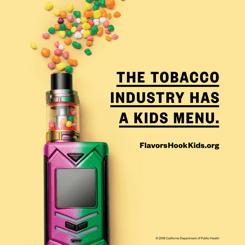April 26, 2018
It’s bad enough that e-cigarettes are a strong gateway to cigarette smoking, including stimulating kids who are experimenting with cigarettes to become established smokers, but now there is evidence that, like cigarettes, they are a gateway for marijuana.
Hongying Dai and colleagues used the FDA PATH study to examine the association between e-cigarette (and cigarette) use at baseline with marijuana use one year later among kids who had never used marijuana at baseline. In their paper “Electronic cigarettes and future marijuana use: A longitudinal study” published in Pediatrics they find that any e-cigarette use at baseline about doubles the odds of using marijuana a year later.
The effects of smoking cigarettes at baseline is an independent effect with about the same magnitude.
The impact on younger kids was bigger.
We found a similar independent of marijuana use on cigarette smoking initiation in our study of the effects of youth initiating with any non-cigarette product (including e-cigarettes).
Dai and collagues have an interesting comment on what may be causing this effect:
April 26, 2018
Ken Warner and David Mendez recently published another population model to estimate the public health effects of the advent of e-cigarettes, “E-cigarettes: Comparing the Possible Risks of Increasing Smoking Initiation with the Potential Benefits of Increasing Smoking Cessation,” in Nicotine and Tobacco Research. In contrast to several (but not all) earlier models, they found population benefits, “[w]ith base-case assumptions, the population gains almost 3.3 million life-years by 2070.”
The question several people have asked me, is why such different conclusions?
Most of these models are generally structured to project the effects of e-cigarettes over time as the population ages and people enter and leave the tobacco market by starting to use tobacco, stopping using tobacco, or dying. (The one Sara Kalkhoran and I developed is a steady state model at equilibrium.) While there are some differences in how people to this, these differences do not explain the different outcomes.
April 24, 2018
There has been growing public concern about the explosive growth of flavored tobacco products, particularly the explosive growth of JUUL e-cigarettes among kids.
Public health responded today on both coasts.
 The California Department of Public Health launched a brilliant (and colorful) educational effort on the impact of flavored tobacco products on kids. You can see the TV ads on “the tobacco industry’s kids menu” here. At least two of the ads, Fruit Candy and Bedroom feature JUUL. The accompanying web page https://www.flavorshookkids.org/ gives loads of great information and shows the print ads.
The California Department of Public Health launched a brilliant (and colorful) educational effort on the impact of flavored tobacco products on kids. You can see the TV ads on “the tobacco industry’s kids menu” here. At least two of the ads, Fruit Candy and Bedroom feature JUUL. The accompanying web page https://www.flavorshookkids.org/ gives loads of great information and shows the print ads.
I never cease to be amazed at how talented CDPH and their ad agency Duncan Channon are at taking complicated science and tobacco industry behavior and boiling them down to compelling messages that people can understand.
April 24, 2018
Recently the FDA issued a new guidance to the tobacco industry rolling back the amount of information that companies selling newly deemed products (e-cigarettes, hookah, and others) have to provide to the FDA. My colleagues and I just submitted this comment to the FDA pointing out the problems with the new guidance and how it will compromise the FDA’s ability to protect the public health. The Regulations.gov tracking number is 1k2-92rz-j3us. A PDF of the comment, which has all the footnotes, is available here.
FDA should revise its new guidance on listing of ingredients in tobacco products to require disclosure of all ingredients that can become toxic during normal use
Lauren K. Lempert, JD, MPH; Suzaynn Schick, PhD; Yogi H. Hendlin, PhD;
Neal L. Benowitz, MD; Peyton Jacob, PhD; Stanton A. Glantz, PhD
University of California San Francisco
April 24, 2018
Docket No. FDA-2009-D-0524
April 19, 2018
The UCSF Industry Documents Library (IDL) is pleased to announce the addition of two new collections to our Chemical Industry Documents Archive. These documents reveal the scientific, legislative, regulatory and public relations activities of the agrichemical industry in defense of its products and profits.
These documents can be searched at the same time as the UCSF Truth Tobacco Industry Documents, making it easier to identify cross-industry connections.
